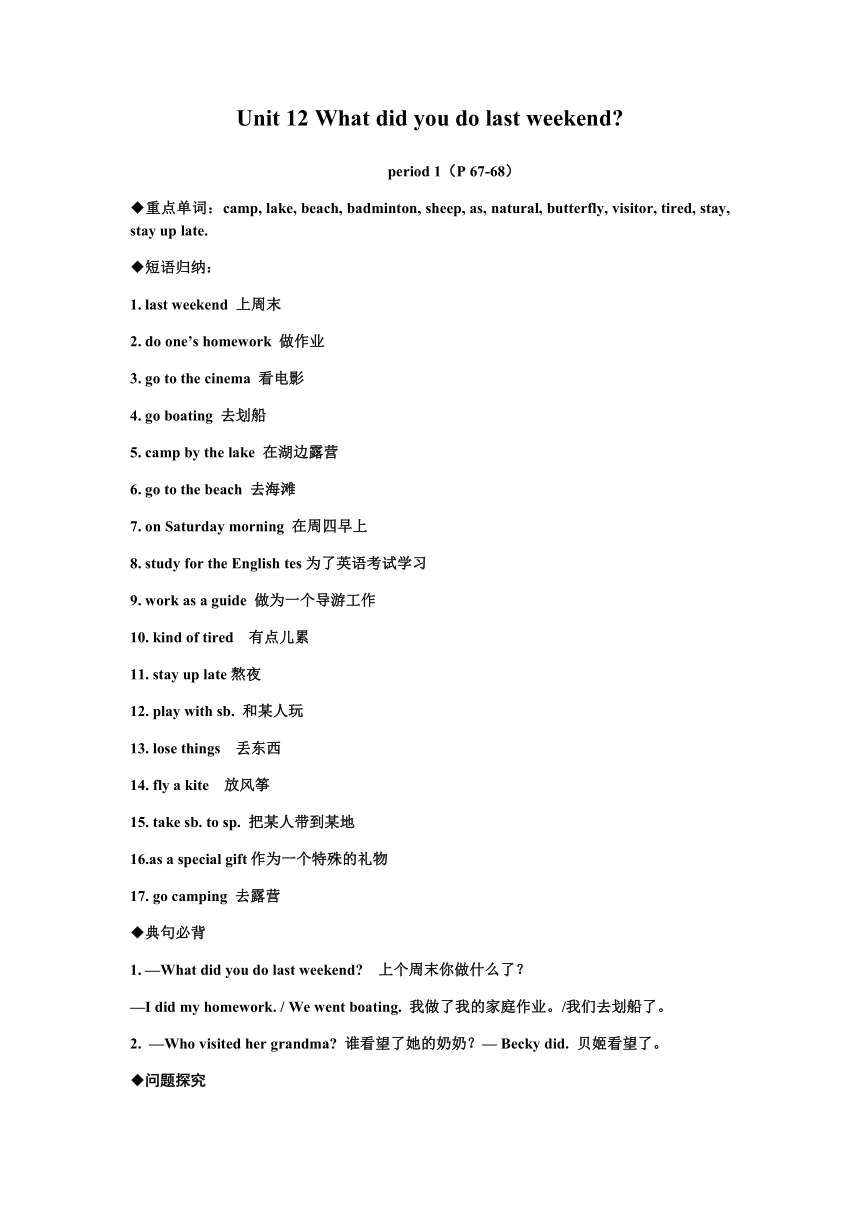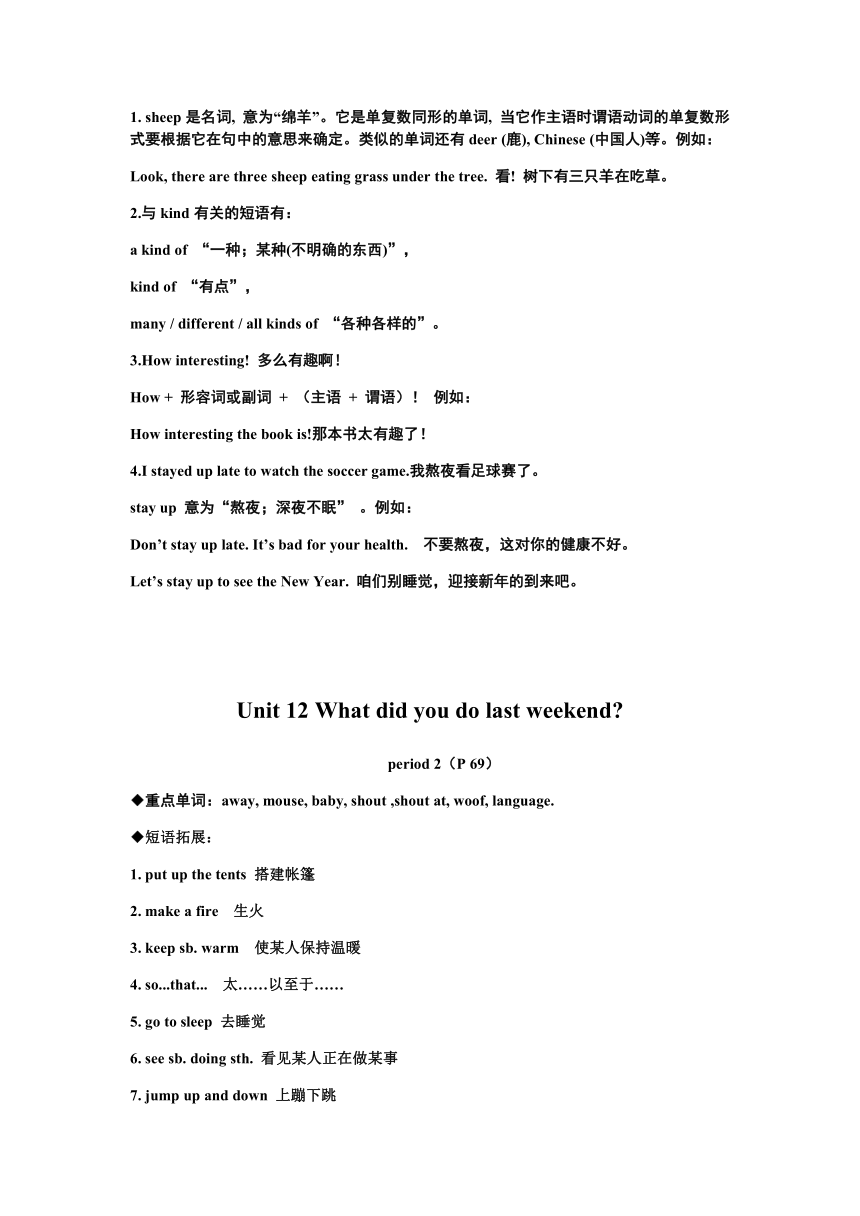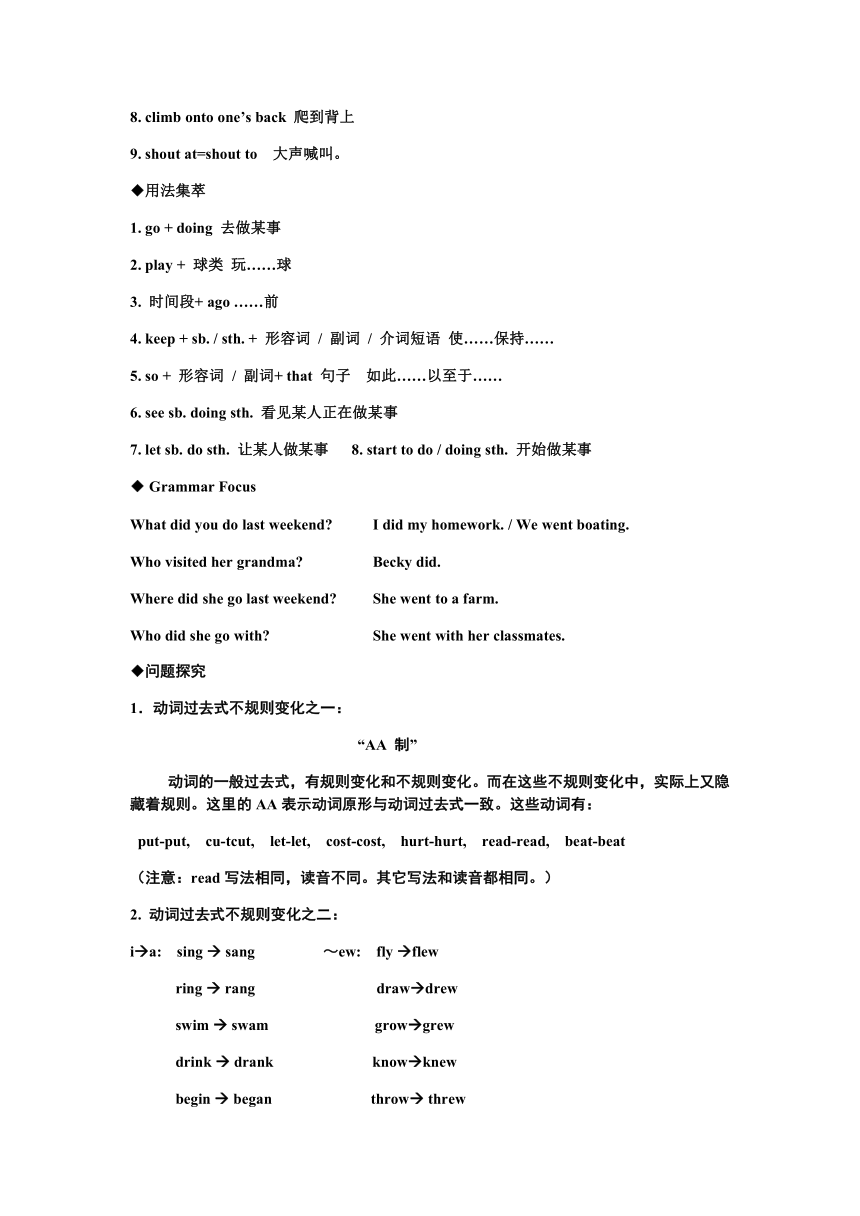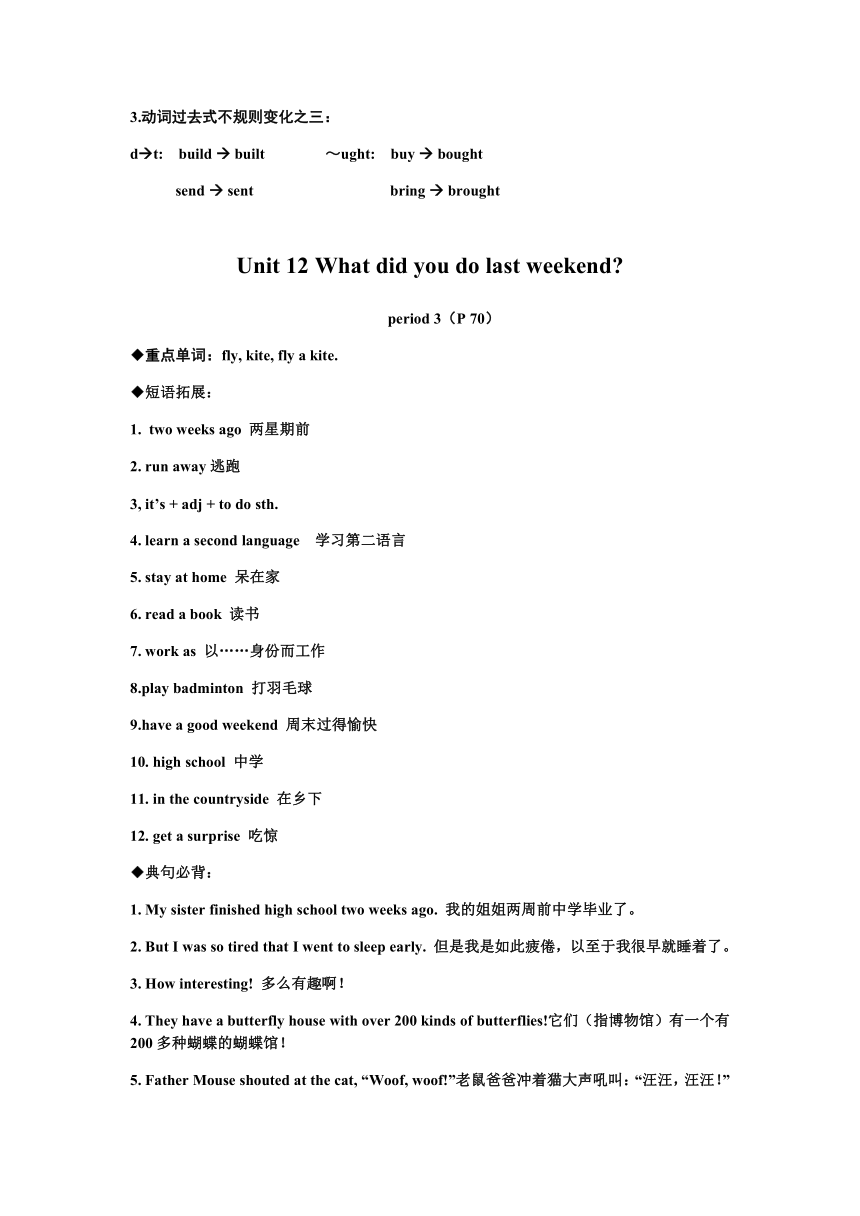Unit 12 What did you do last weekend 暑假复习学案
文档属性
| 名称 | Unit 12 What did you do last weekend 暑假复习学案 |  | |
| 格式 | docx | ||
| 文件大小 | 120.1KB | ||
| 资源类型 | 教案 | ||
| 版本资源 | 人教新目标(Go for it)版 | ||
| 科目 | 英语 | ||
| 更新时间 | 2023-08-08 23:04:31 | ||
图片预览




文档简介
Unit 12 What did you do last weekend
period 1(P 67-68)
◆重点单词:camp, lake, beach, badminton, sheep, as, natural, butterfly, visitor, tired, stay, stay up late.
◆短语归纳:
1. last weekend 上周末
2. do one’s homework 做作业
3. go to the cinema 看电影
4. go boating 去划船
5. camp by the lake 在湖边露营
6. go to the beach 去海滩
7. on Saturday morning 在周四早上
8. study for the English tes为了英语考试学习
9. work as a guide 做为一个导游工作
10. kind of tired 有点儿累
11. stay up late熬夜
12. play with sb. 和某人玩
13. lose things 丢东西
14. fly a kite 放风筝
15. take sb. to sp. 把某人带到某地
16.as a special gift作为一个特殊的礼物
17. go camping 去露营
◆典句必背
1. —What did you do last weekend 上个周末你做什么了?
—I did my homework. / We went boating. 我做了我的家庭作业。/我们去划船了。
—Who visited her grandma 谁看望了她的奶奶?— Becky did. 贝姬看望了。
◆问题探究
1. sheep是名词, 意为“绵羊”。它是单复数同形的单词, 当它作主语时谓语动词的单复数形式要根据它在句中的意思来确定。类似的单词还有deer (鹿), Chinese (中国人)等。例如:
Look, there are three sheep eating grass under the tree. 看! 树下有三只羊在吃草。
2.与kind有关的短语有:
a kind of “一种;某种(不明确的东西)”,
kind of “有点”,
many / different / all kinds of “各种各样的”。
3.How interesting! 多么有趣啊!
How + 形容词或副词 + (主语 + 谓语)! 例如:
How interesting the book is!那本书太有趣了!
4.I stayed up late to watch the soccer game.我熬夜看足球赛了。
stay up 意为“熬夜;深夜不眠” 。例如:
Don’t stay up late. It’s bad for your health. 不要熬夜,这对你的健康不好。
Let’s stay up to see the New Year. 咱们别睡觉,迎接新年的到来吧。
Unit 12 What did you do last weekend
period 2(P 69)
◆重点单词:away, mouse, baby, shout ,shout at, woof, language.
◆短语拓展:
1. put up the tents 搭建帐篷
2. make a fire 生火
3. keep sb. warm 使某人保持温暖
4. so...that... 太……以至于……
5. go to sleep 去睡觉
6. see sb. doing sth. 看见某人正在做某事
7. jump up and down 上蹦下跳
8. climb onto one’s back 爬到背上
9. shout at=shout to 大声喊叫。
◆用法集萃
1. go + doing 去做某事
2. play + 球类 玩……球
3. 时间段+ ago ……前
4. keep + sb. / sth. + 形容词 / 副词 / 介词短语 使……保持……
5. so + 形容词 / 副词+ that 句子 如此……以至于……
6. see sb. doing sth. 看见某人正在做某事
7. let sb. do sth. 让某人做某事 8. start to do / doing sth. 开始做某事
◆ Grammar Focus
What did you do last weekend I did my homework. / We went boating.
Who visited her grandma Becky did.
Where did she go last weekend She went to a farm.
Who did she go with She went with her classmates.
◆问题探究
1.动词过去式不规则变化之一:
“AA 制”
动词的一般过去式,有规则变化和不规则变化。而在这些不规则变化中,实际上又隐藏着规则。这里的AA表示动词原形与动词过去式一致。这些动词有:
put-put, cu-tcut, let-let, cost-cost, hurt-hurt, read-read, beat-beat
(注意:read写法相同,读音不同。其它写法和读音都相同。)
2. 动词过去式不规则变化之二:
ia: sing sang ~ew: fly flew
ring rang drawdrew
swim swam growgrew
drink drank knowknew
begin began throw threw
3.动词过去式不规则变化之三:
dt: build built ~ught: buy bought
send sent bring brought
Unit 12 What did you do last weekend
period 3(P 70)
◆重点单词:fly, kite, fly a kite.
◆短语拓展:
two weeks ago 两星期前
2. run away逃跑
3, it’s + adj + to do sth.
4. learn a second language 学习第二语言
5. stay at home 呆在家
6. read a book 读书
7. work as 以……身份而工作
8.play badminton 打羽毛球
9.have a good weekend 周末过得愉快
10. high school 中学
11. in the countryside 在乡下
12. get a surprise 吃惊
◆典句必背:
1. My sister finished high school two weeks ago. 我的姐姐两周前中学毕业了。
2. But I was so tired that I went to sleep early. 但是我是如此疲倦,以至于我很早就睡着了。
3. How interesting! 多么有趣啊!
4. They have a butterfly house with over 200 kinds of butterflies!它们(指博物馆)有一个有200多种蝴蝶的蝴蝶馆!
5. Father Mouse shouted at the cat, “Woof, woof!”老鼠爸爸冲着猫大声吼叫:“汪汪,汪汪!”
6.We shouted to our parents to let them know about the danger.我们对父母大声叫喊,想让他们知道我们的危险。
7.—Did you go anything interesting last weekend
—Not really, but I visited my sister.
—My sister finished high school two weeks ago.
◆问题探究
1. My sister finished high school two weeks ago.
two weeks ago “两星期前”,一段时间 + ago意为“多长时间之前”,是表达过去的时间。它常与一般过去时连用。如:
三天前,我们参观了自然历史博物馆。We visited the Natural History Museum three days ago.
【辨析】before 意为“在……之前”,
其后可以跟一个时间的点, 表示“在某个时间点之前”, 但不一定用于一般过去时态。如:
我常在七点钟前去上学。I usually go to school before seven.
此外, before也可以单独用, 意为“以前”, 可用于一般过去时态中。如:
以前我不知道那件事情。 I didn’t know that before.
2. There we put up our tents and ...
put up 意为“搭起;举起”。如:
让我们将帐篷搭起来吧。 Let’s put up the tent.
如果你有什么问题,请举起手来。If you have any questions, please put up your hands.
Unit 12 What did you do last weekend
period 4(P 71)
◆重点单词:also, people, center, home, today, make, weekend, teach,musician
◆短语归纳:
1. make a fire 生火
2. each other 互相
3. go to sleep 入睡
4. look out of…向……外看
5. up and down 上上下下
6. wake…up 把……弄醒
7. move into… 移进……
8. a swimming pool 一个游泳池
◆典句必背:
1. Well, son, that’s why it’s important to learn a second language.所以嘛,孩子,这就是为什么学习外语重要啦。
…it was important not to go near a snake. 重要的是不要靠近蛇。
2. As a special gift, our parents took us to India.作为一份特殊的礼物,我爸妈带着我们去了印度。
3. There we put up tents and make a fire to keep us warm and cook food on.在那里我们架起帐逢,生火取暖并做饭。
4. On the first night, … 在头一天夜里,……
5. But I was so tired that I went to sleep early. 但是我太累了,所以早早就睡着了。I was so scared that I couldn’t move. 我是那么害怕,一动都不敢动。
6. …we saw a big snake sleeping near the fire. 我们看见一条大蛇正在篝火附近睡觉。
7. My dad told me later that snakes … can feel things moving. 后来我爸告诉我蛇……能够感到东西的震动。
◆问题探究
I was so tired that I went to sleep early.
句中so ... that ... 的意思是“如此……以至于……”。如:
He is so young that he can’t look after himself.他如此小以至于不能照顾自己。
【运用】将下面的句子翻译成英语。
他如此忙以至于没有吃午饭。
2. My dad started to jump up and down in their tent.
start 作动词, 可意为“开始;着手”。
常用结构为start to do sth.和start doing sth. (开始做某事)。如:
I started to do / doing my homework at 5:30. 我五点半开始做作业的。
【运用】将下面的句子翻译成英语。
你昨天什么时候开始做晚饭的?
3. This woke the snake up and it moved into the forest near the lake.
wake up 意为“唤醒”, 后面可以跟名词或代词; 跟名词时可以放在wake up的后面或中间; 但是如果跟代词的话应放于 wake up的中间。如:
不要如此大声说话, 你会将他们吵醒。Don’t speak so loud. You’ll wake them up.
Unit 12 What did you do last weekend
period 5(P 72)
◆话题写作
1.
My friend Li Hua came to visit me on May Day. During the following days I showed him around the city. We went to the Guangzhou Museum on the morning of May 2. We learned much about the history of Guangzhou. In the afternoon., we climbed the Baiyun Hills. It was really great fun! In the evening. I took Li Hua to the night zoo. It was interesting to see animals at night. The next day, we went to the bookshops to buy books. Though we were very tired, we enjoyed ourselves very much.
2.
My last weekend was kind of busy. I washed my clothes on Saturday morning. On Saturday afternoon, I went to the library. I read a book there. I cooked dinner in the evening. On Sunday morning, I went to the supermarket with my mother. On Sunday afternoon, I played ping-pong. On Sunday evening, I did my homework.
◆单元小结
◆教学反思
period 1(P 67-68)
◆重点单词:camp, lake, beach, badminton, sheep, as, natural, butterfly, visitor, tired, stay, stay up late.
◆短语归纳:
1. last weekend 上周末
2. do one’s homework 做作业
3. go to the cinema 看电影
4. go boating 去划船
5. camp by the lake 在湖边露营
6. go to the beach 去海滩
7. on Saturday morning 在周四早上
8. study for the English tes为了英语考试学习
9. work as a guide 做为一个导游工作
10. kind of tired 有点儿累
11. stay up late熬夜
12. play with sb. 和某人玩
13. lose things 丢东西
14. fly a kite 放风筝
15. take sb. to sp. 把某人带到某地
16.as a special gift作为一个特殊的礼物
17. go camping 去露营
◆典句必背
1. —What did you do last weekend 上个周末你做什么了?
—I did my homework. / We went boating. 我做了我的家庭作业。/我们去划船了。
—Who visited her grandma 谁看望了她的奶奶?— Becky did. 贝姬看望了。
◆问题探究
1. sheep是名词, 意为“绵羊”。它是单复数同形的单词, 当它作主语时谓语动词的单复数形式要根据它在句中的意思来确定。类似的单词还有deer (鹿), Chinese (中国人)等。例如:
Look, there are three sheep eating grass under the tree. 看! 树下有三只羊在吃草。
2.与kind有关的短语有:
a kind of “一种;某种(不明确的东西)”,
kind of “有点”,
many / different / all kinds of “各种各样的”。
3.How interesting! 多么有趣啊!
How + 形容词或副词 + (主语 + 谓语)! 例如:
How interesting the book is!那本书太有趣了!
4.I stayed up late to watch the soccer game.我熬夜看足球赛了。
stay up 意为“熬夜;深夜不眠” 。例如:
Don’t stay up late. It’s bad for your health. 不要熬夜,这对你的健康不好。
Let’s stay up to see the New Year. 咱们别睡觉,迎接新年的到来吧。
Unit 12 What did you do last weekend
period 2(P 69)
◆重点单词:away, mouse, baby, shout ,shout at, woof, language.
◆短语拓展:
1. put up the tents 搭建帐篷
2. make a fire 生火
3. keep sb. warm 使某人保持温暖
4. so...that... 太……以至于……
5. go to sleep 去睡觉
6. see sb. doing sth. 看见某人正在做某事
7. jump up and down 上蹦下跳
8. climb onto one’s back 爬到背上
9. shout at=shout to 大声喊叫。
◆用法集萃
1. go + doing 去做某事
2. play + 球类 玩……球
3. 时间段+ ago ……前
4. keep + sb. / sth. + 形容词 / 副词 / 介词短语 使……保持……
5. so + 形容词 / 副词+ that 句子 如此……以至于……
6. see sb. doing sth. 看见某人正在做某事
7. let sb. do sth. 让某人做某事 8. start to do / doing sth. 开始做某事
◆ Grammar Focus
What did you do last weekend I did my homework. / We went boating.
Who visited her grandma Becky did.
Where did she go last weekend She went to a farm.
Who did she go with She went with her classmates.
◆问题探究
1.动词过去式不规则变化之一:
“AA 制”
动词的一般过去式,有规则变化和不规则变化。而在这些不规则变化中,实际上又隐藏着规则。这里的AA表示动词原形与动词过去式一致。这些动词有:
put-put, cu-tcut, let-let, cost-cost, hurt-hurt, read-read, beat-beat
(注意:read写法相同,读音不同。其它写法和读音都相同。)
2. 动词过去式不规则变化之二:
ia: sing sang ~ew: fly flew
ring rang drawdrew
swim swam growgrew
drink drank knowknew
begin began throw threw
3.动词过去式不规则变化之三:
dt: build built ~ught: buy bought
send sent bring brought
Unit 12 What did you do last weekend
period 3(P 70)
◆重点单词:fly, kite, fly a kite.
◆短语拓展:
two weeks ago 两星期前
2. run away逃跑
3, it’s + adj + to do sth.
4. learn a second language 学习第二语言
5. stay at home 呆在家
6. read a book 读书
7. work as 以……身份而工作
8.play badminton 打羽毛球
9.have a good weekend 周末过得愉快
10. high school 中学
11. in the countryside 在乡下
12. get a surprise 吃惊
◆典句必背:
1. My sister finished high school two weeks ago. 我的姐姐两周前中学毕业了。
2. But I was so tired that I went to sleep early. 但是我是如此疲倦,以至于我很早就睡着了。
3. How interesting! 多么有趣啊!
4. They have a butterfly house with over 200 kinds of butterflies!它们(指博物馆)有一个有200多种蝴蝶的蝴蝶馆!
5. Father Mouse shouted at the cat, “Woof, woof!”老鼠爸爸冲着猫大声吼叫:“汪汪,汪汪!”
6.We shouted to our parents to let them know about the danger.我们对父母大声叫喊,想让他们知道我们的危险。
7.—Did you go anything interesting last weekend
—Not really, but I visited my sister.
—My sister finished high school two weeks ago.
◆问题探究
1. My sister finished high school two weeks ago.
two weeks ago “两星期前”,一段时间 + ago意为“多长时间之前”,是表达过去的时间。它常与一般过去时连用。如:
三天前,我们参观了自然历史博物馆。We visited the Natural History Museum three days ago.
【辨析】before 意为“在……之前”,
其后可以跟一个时间的点, 表示“在某个时间点之前”, 但不一定用于一般过去时态。如:
我常在七点钟前去上学。I usually go to school before seven.
此外, before也可以单独用, 意为“以前”, 可用于一般过去时态中。如:
以前我不知道那件事情。 I didn’t know that before.
2. There we put up our tents and ...
put up 意为“搭起;举起”。如:
让我们将帐篷搭起来吧。 Let’s put up the tent.
如果你有什么问题,请举起手来。If you have any questions, please put up your hands.
Unit 12 What did you do last weekend
period 4(P 71)
◆重点单词:also, people, center, home, today, make, weekend, teach,musician
◆短语归纳:
1. make a fire 生火
2. each other 互相
3. go to sleep 入睡
4. look out of…向……外看
5. up and down 上上下下
6. wake…up 把……弄醒
7. move into… 移进……
8. a swimming pool 一个游泳池
◆典句必背:
1. Well, son, that’s why it’s important to learn a second language.所以嘛,孩子,这就是为什么学习外语重要啦。
…it was important not to go near a snake. 重要的是不要靠近蛇。
2. As a special gift, our parents took us to India.作为一份特殊的礼物,我爸妈带着我们去了印度。
3. There we put up tents and make a fire to keep us warm and cook food on.在那里我们架起帐逢,生火取暖并做饭。
4. On the first night, … 在头一天夜里,……
5. But I was so tired that I went to sleep early. 但是我太累了,所以早早就睡着了。I was so scared that I couldn’t move. 我是那么害怕,一动都不敢动。
6. …we saw a big snake sleeping near the fire. 我们看见一条大蛇正在篝火附近睡觉。
7. My dad told me later that snakes … can feel things moving. 后来我爸告诉我蛇……能够感到东西的震动。
◆问题探究
I was so tired that I went to sleep early.
句中so ... that ... 的意思是“如此……以至于……”。如:
He is so young that he can’t look after himself.他如此小以至于不能照顾自己。
【运用】将下面的句子翻译成英语。
他如此忙以至于没有吃午饭。
2. My dad started to jump up and down in their tent.
start 作动词, 可意为“开始;着手”。
常用结构为start to do sth.和start doing sth. (开始做某事)。如:
I started to do / doing my homework at 5:30. 我五点半开始做作业的。
【运用】将下面的句子翻译成英语。
你昨天什么时候开始做晚饭的?
3. This woke the snake up and it moved into the forest near the lake.
wake up 意为“唤醒”, 后面可以跟名词或代词; 跟名词时可以放在wake up的后面或中间; 但是如果跟代词的话应放于 wake up的中间。如:
不要如此大声说话, 你会将他们吵醒。Don’t speak so loud. You’ll wake them up.
Unit 12 What did you do last weekend
period 5(P 72)
◆话题写作
1.
My friend Li Hua came to visit me on May Day. During the following days I showed him around the city. We went to the Guangzhou Museum on the morning of May 2. We learned much about the history of Guangzhou. In the afternoon., we climbed the Baiyun Hills. It was really great fun! In the evening. I took Li Hua to the night zoo. It was interesting to see animals at night. The next day, we went to the bookshops to buy books. Though we were very tired, we enjoyed ourselves very much.
2.
My last weekend was kind of busy. I washed my clothes on Saturday morning. On Saturday afternoon, I went to the library. I read a book there. I cooked dinner in the evening. On Sunday morning, I went to the supermarket with my mother. On Sunday afternoon, I played ping-pong. On Sunday evening, I did my homework.
◆单元小结
◆教学反思
同课章节目录
